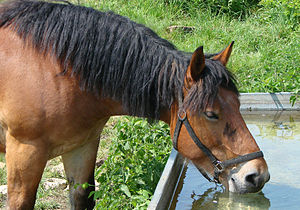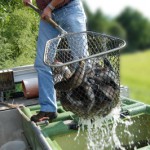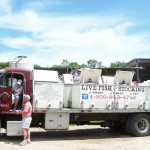Heat and humidity  put an added burden on horses during training, showing and hauling. Horses are actually better equipped to work in cold weather than in the heat. They build up a tremendous amount of body heat due to the internal heat produced by fiber digestion and the large mass of working muscles, combined with insulation from their hair coat and body fat cover.
put an added burden on horses during training, showing and hauling. Horses are actually better equipped to work in cold weather than in the heat. They build up a tremendous amount of body heat due to the internal heat produced by fiber digestion and the large mass of working muscles, combined with insulation from their hair coat and body fat cover.
Normal body temperature for a mature horse at rest is 99 – 101° F. Under working conditions this can rise to 102 – 104° F, but with the same work under hot, humid conditions body temperature can elevate dangerously to 106 – 107° F. Body temperatures of 104° F or higher for any extended amount of time can be life threatening.
A horse’s main cooling mechanism is evaporation of sweat from the skin surface. Increased blood flow in the veins and capillaries close to the skin and elevated respiration rate help dissipate internal heat as well. Increasing humidity reduces the evaporation of sweat from the skin, thereby decreasing the cooling ability. Under extreme heat, especially when humidity is high, the body’s cooling mechanisms may not work well enough to dissipate the heat generated. This can lead to heat stress which is hard on the body and can impair performance.
A simple calculation of Ambient Temperature (° F) + Relative Humidity (%) – Wind Speed (mph) will indicate heat stress risk level. For example, ambient temperature of 98°F with a 55% relative humidity and wind at 5 mph; 98 + 55 – 5 = 148. If the calculation equals 130 or less, then the horse’s own cooling mechanisms will work effectively. Between 140 and 170, the horse has partial cooling capacity and may need some assistance cooling down. When the result is greater than 180, the horse has a significantly impaired ability to cool and is at high risk for heat stress or even heat stroke.
Horses unaccustomed to the heat or those not properly conditioned will sweat more for a given amount of work than fit or acclimatized horses. While it is necessary for horses to sweat to help cool the body, sweat generated during work robs the body of fluids and important nutrients that must be replenished. Horse sweat is more concentrated than human sweat, meaning it contains a higher concentration of electrolytes. Electrolytes are electrically charged mineral salts that play a large role in water balance and are integral to nerve and muscle function. An electrolyte imbalance can lead to heart problems, digestive dysfunction, muscle cramps and nervousness. The primary electrolytes lost in equine sweat are sodium, potassium, and chloride.
Horses working at light to moderate levels will receive adequate electrolytes from nutritionally balanced feed, good quality hay and a salt block or a couple ounces of loose salt per day. Even if these horses are sweating a bit, a good diet along with clean water will replenish everything lost in the sweat. However, horses working very hard in hot, humid climates and sweating a great deal may need additional electrolyte supplementation.
Electrolyte supplementation should be approached carefully. First, never give electrolyte supplementation to an already dehydrated horse. Second, the body has a set requirement for electrolytes but doesn’t store any extra. If supplemental electrolytes are provided in excess amounts, the body will become very efficient at eliminating them in the urine. This causes the horse to urinate more frequently, thus increasing water needs and making it more difficult to stay hydrated. Also, if the body is flushing excess electrolytes out of the system to keep the balance, on a day when additional electrolytes may be needed, they won’t be available.
Therefore, the best recommendation is to provide a well balanced feed, good quality hay and free choice salt and water on a daily basis. Provide additional electrolyte supplementation the day before, the day of, and the day after an event in which the horse works extremely hard and sweats excessively. There are many commercial electrolyte supplements available, or a home-made mix of 3 parts salt (sodium chloride) and one part lite salt (potassium chloride) is an option. Remember though, for the vast majority of working horses, the sodium and chloride requirements can be met with a couple ounces of plain salt per day and the potassium, calcium and magnesium requirements will be met by a well balanced quality feed and hay. Therefore additional electrolyte supplementation is needed only at those times when a horse will be sweating large amounts for an extended time frame.
By Karen E. Davison, Ph.D., Manager – Technical Services, Purina Mills, LLC


